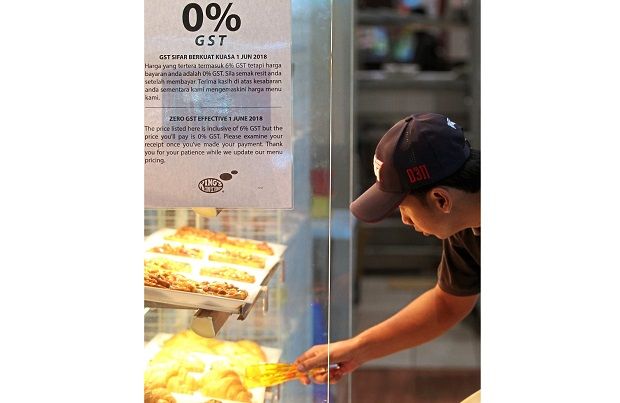
Big impact: Malaysia was the first country in the world to introduce and scrap the GST. – AZMAN GHANI/The Star
THE Barisan Nasional’s 60-year reign came to a grinding halt when it was toppled in the 2018 general election because of two primary reasons – the unpopular goods and services tax (GST) and the 1MDB scandal.
So, it came as a surprise to many, including those in Umno’s leadership, when Prime Minister Datuk Seri Ismail Sabri Yaakob suddenly said that the government hasn’t ruled out the possibility of reinstating the GST.
Some Barisan Nasional leaders privately felt that his remarks were untimely given that the general election would be called soon.
In an interview with Nikkei Asia in Tokyo, published May 31, Ismail Sabri opined that the GST could widen the country’s revenue, but on June 5, the PM quickly clarified that the government was still studying its reintroduction and has not made any decision yet.
He cleared the air by saying he didn’t announce the government would reinstate GST soon, but merely that it was looking into the possibility.
His revelation has, however, re-ignited discussions on the GST and its replacement, the SST (sales and service tax), which was introduced by the Pakatan Harapan government when it took over.
The reality is that after nearly five years, and under three PMs, the SST has not been able to fulfil its objective.
Pakatan made many electoral promises, oblivious to having to fulfil them because the party never thought it would win, in the words of Tun Dr Mahathir Mohamad, but it did by playing the populist card.
The 6% GST first introduced on April 1, 2015, by Datuk Seri Najib Tun Razak came under fire because it was regarded as too high in comparison to Singapore’s, which began with 3% GST taxation in 1994 and presently is at 7%.
But the island republic has announced that it will raise that figure to 9% in two stages, 1% each time, on Jan 1, 2023, and Jan 1, 2024.
The current rate for sales tax in Malaysia is 5-10% while service tax is 6%. But studies now indicate that there is an average shortfall of RM30bil a year following the shift to SST.
The GST was seen as a method to offset the budget deficit and reduce dependence on revenue from Petronas, as it’s not sustainable in the future. However, despite exemptions on many items, including many domestically consumed items such as fresh food, water and electricity, education and health services, it generated much anger.
Malaysia became the first country in the world to introduce and scrap the GST – and now, we’re seeing the impact of that decision.
The GST is viewed as a wider tax net, especially on consumption because only 16.5% of Malaysia’s 15 million workforce is subjected to individual income tax.
That works out to only 2.475 million individual taxpayers contributing to the projected RM37.36bil in total income tax, according to the Fiscal Outlook 2020 report, revealed The Edge.
Another report said that personal income tax in Malaysia averaged 27.29% from 2004 until 2020, reaching an all-time high of 30% in 2020 and a record low of 25% in 2015.
The GST would have been one way of broadening the tax base or risk overburdening the small pool of tax paying individuals and businesses that contribute 45% of the revenue, the report added.
During Pakatan’s administration, many individual taxpayers were hounded by the Inland Revenue Department for expenses spent over the last seven years under the so-called “capital statement” investigations.
Basically, it required a person to produce every single receipt, in hard copy, for every transaction over the previous seven years to justify that it matches their income, and that spread fear like wildfire.
Under normal circumstances, it’s near impossible to produce receipts for the last seven years – even though the law stipulates that one, in fact, should keep them. But many felt they were mere victims to fill up the coffers.
Dr Mahathir revealed in his book about the many complaints that reached him regarding certain figures in the Finance Ministry.
Many businessmen felt that they were being singled out by the Pakatan government – although they were already paying top taxes – to make up for the SST targets, which could never realistically be met.
So, if the present system continues, the 15% of the country’s workforce would have to bear the burden. Personal income taxes contributed only about 15% of federal government revenue in 2019 – about half of the corporate tax haul.
The cash cow – Petronas – has found its resources depleting drastically since 2014, and despite the recent hike in oil prices, much has gone to paying off our subsidised petrol consumption.
In fact, the subsidies bill could more than double to RM28bil this year if crude oil prices rise with the continuing war in Ukraine.
To put it simply, a return of the GST would generate a stable and predictable tax income because it is an efficient tax system, but it needs plenty of education and must be done gradually since everything in Malaysia is put through the political wringer.
Not enough Malaysians are paying taxes to shoulder the burden of running this country while living in one of the most subsidised nations.
According to Finance Minister Tengku Datuk Seri Zafrul Abdul Aziz, Malaysia needs to fork out RM71bil in subsidies this year to keep inflation and the cost of living down.
Basically, we must think of ways to find the money to retain the status quo, including casting a wider tax net.
But Malaysians also want to see that their taxes are being properly spent.





